江西省宜春市2016_2017学年高一英语3月月测习题
- 格式:doc
- 大小:158.00 KB
- 文档页数:15
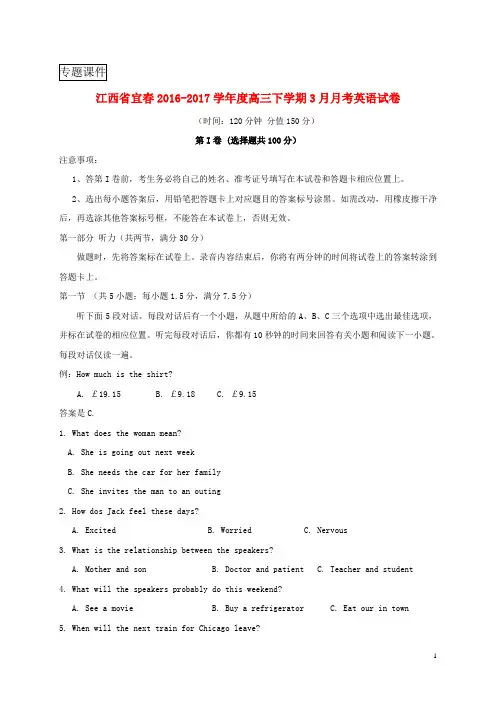
江西省宜春2016-2017学年度高三下学期3月月考英语试卷(时间:120分钟分值150分)第I卷 (选择题共100分)注意事项:1、答第I卷前,考生务必将自己的姓名、准考证号填写在本试卷和答题卡相应位置上。
2、选出每小题答案后,用铅笔把答题卡上对应题目的答案标号涂黑。
如需改动,用橡皮擦干净后,再选涂其他答案标号框,不能答在本试卷上,否则无效。
第一部分听力(共两节,满分30分)做题时,先将答案标在试卷上。
录音内容结束后,你将有两分钟的时间将试卷上的答案转涂到答题卡上。
第一节(共5小题;每小题1.5分,满分7.5分)听下面5段对话。
每段对话后有一个小题,从题中所给的A、B、C三个选项中选出最佳选项,并标在试卷的相应位置。
听完每段对话后,你都有10秒钟的时间来回答有关小题和阅读下一小题。
每段对话仅读一遍。
例:How much is the shirt?A. £19.15B. £9.18C. £9.15答案是C.1. What does the woman mean?A. She is going out next weekB. She needs the car for her familyC. She invites the man to an outing2. How dos Jack feel these days?A. ExcitedB. WorriedC. Nervous3. What is the relationship between the speakers?A. Mother and sonB. Doctor and patientC. Teacher and student4. What will the speakers probably do this weekend?A. See a movieB. Buy a refrigeratorC. Eat our in town5. When will the next train for Chicago leave?A. At 8:30B. At 10:30C. At 11:30第二节(共15小题;每小题1.5分,满分22.5分)听下面5段对话或独白。
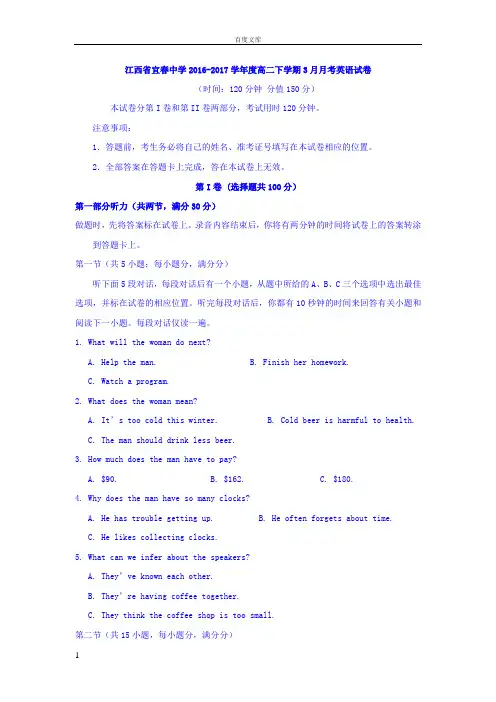
江西省宜春中学2016-2017学年度高二下学期3月月考英语试卷(时间:120分钟分值150分)本试卷分第I卷和第II卷两部分,考试用时120分钟。
注意事项:1.答题前,考生务必将自己的姓名、准考证号填写在本试卷相应的位置。
2.全部答案在答题卡上完成,答在本试卷上无效。
第I卷 (选择题共100分)第一部分听力(共两节,满分30分)做题时,先将答案标在试卷上。
录音内容结束后,你将有两分钟的时间将试卷上的答案转涂到答题卡上。
第一节(共5小题;每小题分,满分分)听下面5段对话,每段对话后有一个小题,从题中所给的A、B、C三个选项中选出最佳选项,并标在试卷的相应位置。
听完每段对话后,你都有10秒钟的时间来回答有关小题和阅读下一小题。
每段对话仅读一遍。
1. What will the woman do next?A. Help the man.B. Finish her homework.C. Watch a program.2. What does the woman mean?A. It’s too cold this winter.B. Cold beer is harmful to health.C. The man should drink less beer.3. How much does the man have to pay?A. $90.B. $162.C. $180.4. Why does the man have so many clocks?A. He has trouble getting up.B. He often forgets about time.C. He likes collecting clocks.5. What can we infer about the speakers?A. They’ve known each other.B. They’re having coffee together.C. They think the coffee shop is too small.第二节(共15小题,每小题分,满分分)听下面5段对话或独白。
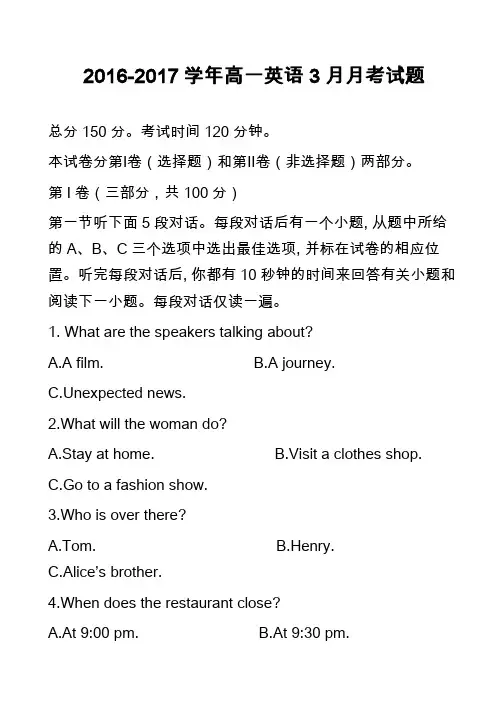
2016-2017学年高一英语3月月考试题总分150分。
考试时间120分钟。
本试卷分第Ⅰ卷(选择题)和第Ⅱ卷(非选择题)两部分。
第I卷(三部分,共100分)第一节听下面5段对话。
每段对话后有一个小题, 从题中所给的A、B、C三个选项中选出最佳选项, 并标在试卷的相应位置。
听完每段对话后, 你都有10秒钟的时间来回答有关小题和阅读下一小题。
每段对话仅读一遍。
1. What are the speakers talking about?A.A film.B.A journey.C.Unexpected news.2.What will the woman do?A.Stay at home.B.Visit a clothes shop.C.Go to a fashion show.3.Who is over there?A.Tom.B.Henry.C.Alice’s brother.4.When does the restaurant close?A.At 9:00 pm.B.At 9:30 pm.C.At 11:00 pm.5.What happened to the woman last weekend?A.She had an unpleasant trip.B.Dirty water went into her kitchen.C.Her new apartment was flooded.第二节听下面5段对话或独白。
每段对话或独白后有几个小题,从题中所给的A、B、C三个选项中选出最佳选项,并标在试卷的相应位置。
听每段对话或独白前,你将有时间阅读各个小题,每小题5秒钟;听完后,各小题将给出5秒钟的作答时间。
每段对话或独白读两遍。
听下面一段对话,回答第6和第7两个小题。
6.Who will go to the Big Boogie?A.Tom.B.Mark.C.Peter.7.What will the woman do next?A.Finish an essay.B.Go bird-watching.C.Make phone calls.听下面一段对话,回答第8和第9两个小题。
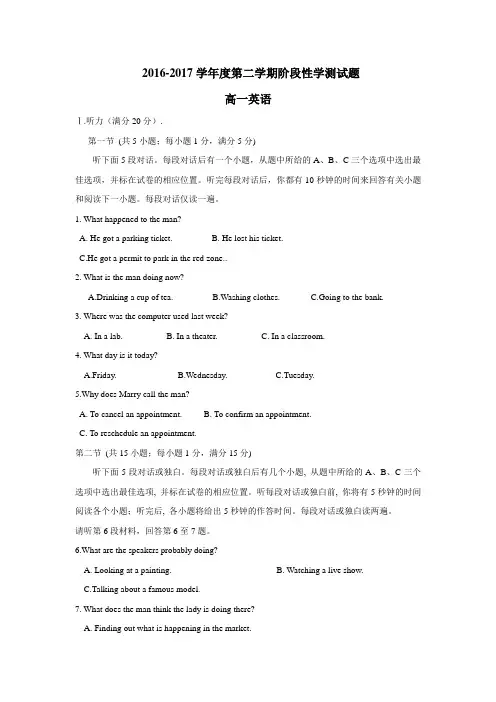
2016-2017学年度第二学期阶段性学测试题高一英语Ⅰ.听力(满分20分).第一节(共5小题;每小题1分,满分5分)听下面5段对话。
每段对话后有一个小题,从题中所给的A、B、C三个选项中选出最佳选项,并标在试卷的相应位置。
听完每段对话后,你都有10秒钟的时间来回答有关小题和阅读下一小题。
每段对话仅读一遍。
1. What happened to the man?A. He got a parking ticket.B. He lost his ticket.C.He got a permit to park in the red zone..2. What is the man doing now?A.Drinking a cup of tea.B.Washing clothes.C.Going to the bank.3. Where was the computer used last week?A. In a lab.B. In a theater.C. In a classroom.4. What day is it today?A.Friday.B.Wednesday.C.Tuesday.5.Why does Marry call the man?A. To cancel an appointment.B. To confirm an appointment.C. To reschedule an appointment.第二节(共15小题;每小题1分,满分15分)听下面5段对话或独白。
每段对话或独白后有几个小题, 从题中所给的A、B、C三个选项中选出最佳选项, 并标在试卷的相应位置。
听每段对话或独白前, 你将有5秒钟的时间阅读各个小题;听完后, 各小题将给出5秒钟的作答时间。
每段对话或独白读两遍。
请听第6段材料,回答第6至7题。
6.What are the speakers probably doing?A. Looking at a painting.B. Watching a live show.C.Talking about a famous model.7. What does the man think the lady is doing there?A. Finding out what is happening in the market.B. Buying a new dress.C. Waiting for someone..请听第7段材料,回答第8至9题。
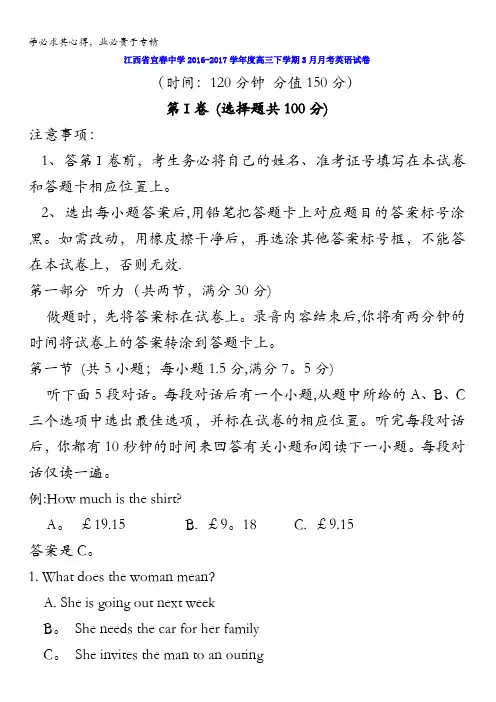
江西省宜春中学2016-2017学年度高三下学期3月月考英语试卷(时间:120分钟分值150分)第I卷(选择题共100分)注意事项:1、答第I卷前,考生务必将自己的姓名、准考证号填写在本试卷和答题卡相应位置上。
2、选出每小题答案后,用铅笔把答题卡上对应题目的答案标号涂黑。
如需改动,用橡皮擦干净后,再选涂其他答案标号框,不能答在本试卷上,否则无效.第一部分听力(共两节,满分30分)做题时,先将答案标在试卷上。
录音内容结束后,你将有两分钟的时间将试卷上的答案转涂到答题卡上。
第一节(共5小题;每小题1.5分,满分7。
5分)听下面5段对话。
每段对话后有一个小题,从题中所给的A、B、C 三个选项中选出最佳选项,并标在试卷的相应位置。
听完每段对话后,你都有10秒钟的时间来回答有关小题和阅读下一小题。
每段对话仅读一遍。
例:How much is the shirt?A。
£19.15 B. £9。
18 C. £9.15答案是C。
1. What does the woman mean?A. She is going out next weekB。
She needs the car for her familyC。
She invites the man to an outing2。
How dos Jack feel these days?A. ExcitedB. WorriedC. Nervous3。
What is the relationship between the speakers?A. Mother and son B。
Doctor and patient C. Teacher and student4。
What will the speakers probably do this weekend?A。
See a movie B. Buy a refrigerator C。
Eat our in town5。
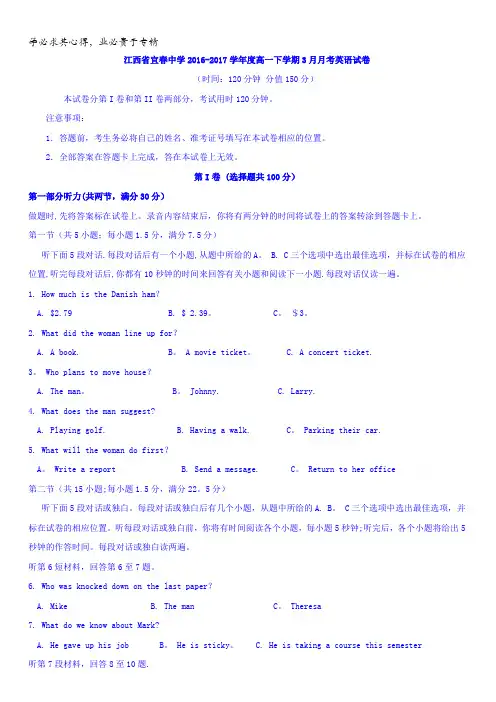
江西省宜春中学2016-2017学年度高一下学期3月月考英语试卷(时间:120分钟分值150分)本试卷分第I卷和第II卷两部分,考试用时120分钟。
注意事项:1.答题前,考生务必将自己的姓名、准考证号填写在本试卷相应的位置。
2.全部答案在答题卡上完成,答在本试卷上无效。
第I卷 (选择题共100分)第一部分听力(共两节,满分30分)做题时,先将答案标在试卷上。
录音内容结束后,你将有两分钟的时间将试卷上的答案转涂到答题卡上。
第一节(共5小题;每小题1.5分,满分7.5分)听下面5段对话.每段对话后有一个小题,从题中所给的A。
B. C三个选项中选出最佳选项,并标在试卷的相应位置,听完每段对话后,你都有10秒钟的时间来回答有关小题和阅读下一小题.每段对话仅读一遍。
1. How much is the Danish ham?A. $2.79B. $ 2.39。
C。
$3。
2. What did the woman line up for?A. A book. B。
A movie ticket。
C. A concert ticket.3。
Who plans to move house?A. The man。
B。
Johnny. C. Larry.4. What does the man suggest?A. Playing golf.B. Having a walk. C。
Parking their car.5. What will the woman do first?A。
Write a report B. Send a message. C。
Return to her office第二节(共15小题;每小题1.5分,满分22。
5分)听下面5段对话或独白。
每段对话或独白后有几个小题,从题中所给的A. B。
C三个选项中选出最佳选项,并标在试卷的相应位置。
听每段对话或独白前,你将有时间阅读各个小题,每小题5秒钟;听完后,各个小题将给出5秒钟的作答时间。
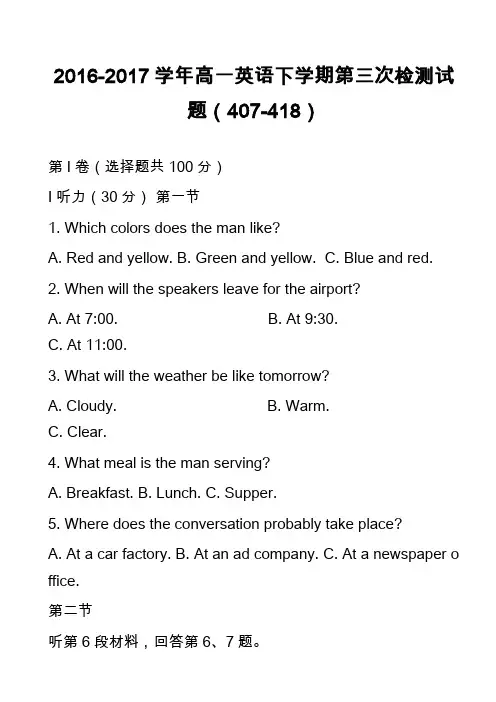
2016-2017学年高一英语下学期第三次检测试题(407-418)第I卷(选择题共100分)I听力(30分)第一节1. Which colors does the man like?A. Red and yellow.B. Green and yellow.C. Blue and red.2. When will the speakers leave for the airport?A. At 7:00.B. At 9:30.C. At 11:00.3. What will the weather be like tomorrow?A. Cloudy.B. Warm.C. Clear.4. What meal is the man serving?A. Breakfast.B. Lunch.C. Supper.5. Where does the conversation probably take place?A. At a car factory.B. At an ad company.C. At a newspaper o ffice.第二节听第6段材料,回答第6、7题。
6. What has the man already packed?A. A pair of shoes.B. Some clothes.C. A camera.7. What is the man preparing for?A. A campingtrip. B. A trip abroad. C. A visit to his grandpa’s house.听第7段材料,回答第8、9题。
8. What does the man want to do?A. Buy a new pet.B. Take a business trip.C. Order some dog food.9. Who will help the man?A. Ms. Smith.B. Mr. Graham.C. The woman.听第8段材料,回答第10至12题。
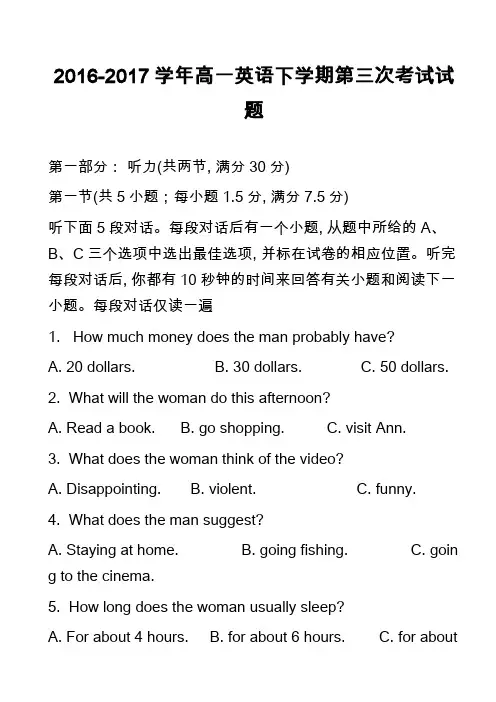
2016-2017学年高一英语下学期第三次考试试题第一部分:听力(共两节, 满分30分)第一节(共5小题;每小题1.5分, 满分7.5分)听下面5段对话。
每段对话后有一个小题, 从题中所给的A、B、C三个选项中选出最佳选项, 并标在试卷的相应位置。
听完每段对话后, 你都有10秒钟的时间来回答有关小题和阅读下一小题。
每段对话仅读一遍1. How much money does the man probably have?A. 20 dollars.B. 30 dollars.C. 50 dollars.2. What will the woman do this afternoon?A. Read a book.B. go shopping.C. visit Ann.3. What does the woman think of the video?A. Disappointing.B. violent.C. funny.4. What does the man suggest?A. Staying at home.B. going fishing.C. going to the cinema.5. How long does the woman usually sleep?A. For about 4 hours.B. for about 6 hours.C. for about8 hours.第二节(共15小题;每小题1.5分,满分22.5分)听下面5段对话或独白。
每段对话或独白后有几个小题,从题中所给的A、B、C三个选项中选出最佳选项,并标在试卷的相应位置。
听每段对话或独白前,你将有时间阅读各个小题,每小题5秒钟;听完后,各小题将给出5秒钟的作答时间。
每段对话或独白读两遍。
听第6段材料,回答第6至7题。
6. What was the woman before probably?A. A secretary.B. a computer programmer.C. a f actory worker.7. What do we know about the woman?A. She gets along well with her colleaguesB. She works ove rtime every day.C. she gets a bad salary.听第7段材料,回答第8至9题。
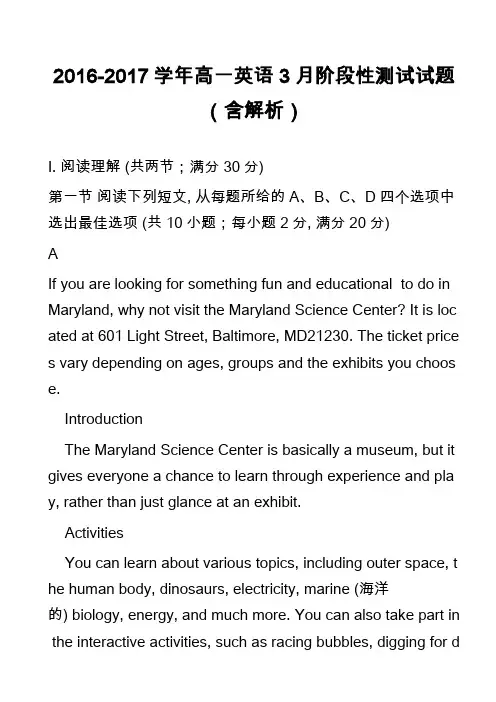
2016-2017学年高一英语3月阶段性测试试题(含解析)I. 阅读理解 (共两节;满分30分)第一节阅读下列短文, 从每题所给的A、B、C、D四个选项中选出最佳选项 (共10小题;每小题2分, 满分20分)AIf you are looking for something fun and educational to do in Maryland, why not visit the Maryland Science Center? It is loc ated at 601 Light Street, Baltimore, MD21230. The ticket price s vary depending on ages, groups and the exhibits you choos e.IntroductionThe Maryland Science Center is basically a museum, but it gives everyone a chance to learn through experience and pla y, rather than just glance at an exhibit.ActivitiesYou can learn about various topics, including outer space, t he human body, dinosaurs, electricity, marine (海洋的) biology, energy, and much more. You can also take part in the interactive activities, such as racing bubbles, digging for dinosaur fossils, using puzzle pieces to construct cars, and so much more.The Davis Planetarium (天文馆)At the Davis Planetarium, you can lie back in a chair and lo ok at the stars while still inside the Science Center. The stars will appear on the ceiling of the theatre as you watch them.There are different shows to catch at the Davis Planetarium . You can learn about the galaxy and astronomy during the D ark Matters show and learn about the stars and planets during the Sky Live show. The One World One Sky show allows chil dren to explore the stars. The Live from the Sun show will tea ch you all about the hot sun.The Kids RoomFor children, they can’t miss the Kids Room. They will be a ble to play in a water area, construct dams and water towers, push buttons, ring doorbells, build with blocks and Legos, and more, and definitely they will learn a lot. In addition, there is a lso an area for kids of two years old and under, where they ca n crawl, walk and explore safely with soft toys.1. What do we know about the Maryland Science Center?A. It charges different prices for parents and children.B. It is regarded as the most popular museum in Maryland.C. It is just a museum where there are many famous exhibitio ns.D. It is mainly designed for children and their families to play t ogether.2. Which activity is not included in the Maryland Science Cent er?A. Taking part in bubble competition.B. Learning the structure of human body.C. Watching famous science fiction films.D. Gaining knowledge of marine creatures.3. Which show should you choose if you want to know why the sun shines?A. The Dark Matters show.B. The Live from the Sun show.C. The One World One Sky show.D. The Sky Live show.4. Which of the following is TRUE about the Kids Room?A. It is designed for parents who have children.B. It provide s a good opportunity for parents to relax.C. Children there need to be companied by their parents.D. It is a good place for children to learn and play at the sametime.【答案】1. A 2. C 3. B 4. D2. 细节理解题。
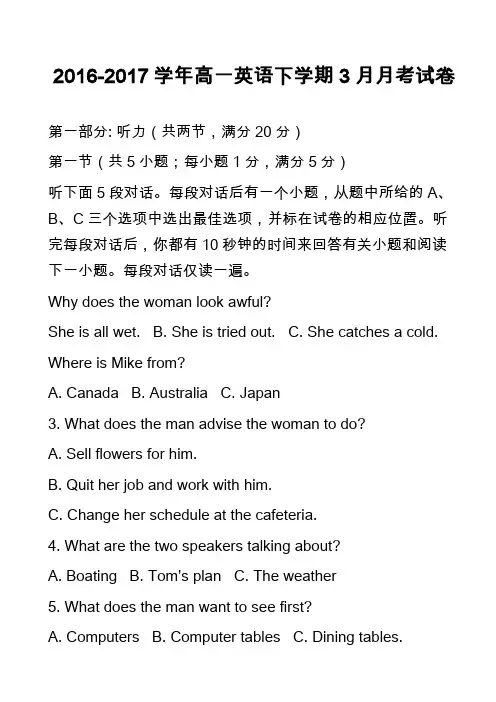
2016-2017学年高一英语下学期3月月考试卷第一部分: 听力(共两节,满分20分)第一节(共5小题;每小题1分,满分5分)听下面5段对话。
每段对话后有一个小题,从题中所给的A、B、C三个选项中选出最佳选项,并标在试卷的相应位置。
听完每段对话后,你都有10秒钟的时间来回答有关小题和阅读下一小题。
每段对话仅读一遍。
Why does the woman look awful?She is all wet. B. She is tried out. C. She catches a cold. Where is Mike from?A. CanadaB. AustraliaC. Japan3. What does the man advise the woman to do?A. Sell flowers for him.B. Quit her job and work with him.C. Change her schedule at the cafeteria.4. What are the two speakers talking about?A. BoatingB. Tom’s planC. The weather5. What does the man want to see first?A. ComputersB. Computer tablesC. Dining tables.第二节(共15小题,每小题1分,满分15分)听下面5段对话或独白。
每段对话或独白后有几个小题,从题中所给的A、B、C三个选项中选出最佳选项,并标在试卷的相应位置。
听每段对话或独白前,你将有时间阅读各小题,每小题5秒钟;听完后,各小题将给出5秒钟的作答时间。
每段对话或独白读两遍。
听下面一段对话,回答第6和第7 两个小题。
6. What is the probable relationship between the two speaker s?A. Waiter and customer.B. Taxi driver and passengerC. Salesman and customer7. How much dose the woman give the man?A. £7B. £7.3C. £8听下面一段对话,回答第8和第9两个小题。
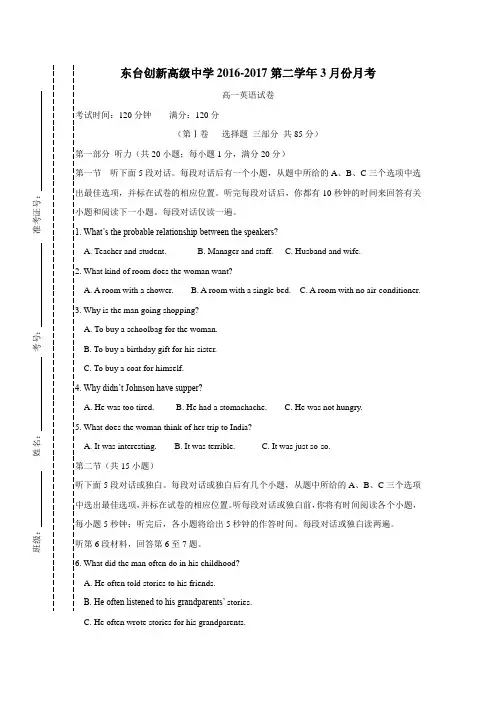
东台创新高级中学2016-2017第二学年3月份月考高一英语试卷考试时间:120分钟 满分:120分(第Ⅰ卷 选择题 三部分 共85分)第一部分 听力(共20小题;每小题1分,满分20分)第一节 听下面5段对话。
每段对话后有一个小题,从题中所给的A 、B 、C 三个选项中选出最佳选项,并标在试卷的相应位置。
听完每段对话后,你都有10秒钟的时间来回答有关小题和阅读下一小题。
每段对话仅读一遍。
1. What’s the probable relationship between the speakers? A. Teacher and student.B. Manager and staff.C. Husband and wife.2. What kind of room does the woman want?A. A room with a shower.B. A room with a single bed.C. A room with no air-conditioner. 3. Why is the man going shopping? A. To buy a schoolbag for the woman. B. To buy a birthday gift for his sister. C. To buy a coat for himself.4. Why didn’t Johnson have supper?A. He was too tired.B. He had a stomachache.C. He was not hungry. 5. What does the woman think of her trip to India?A. It was interesting.B. It was terrible.C. It was just so-so. 第二节(共15小题)听下面5段对话或独白。
英语试卷第一部分听力(共两节,满分30分)做题时,先将答案标在试卷上。
录音内容结束后,你将有两分钟的时间将试卷上的答案转涂到答题卡上。
第一节(共5小题;每小题1.5分,满分7.5分)1. What will the speakers take to the picnic?A. Some drinks.B. Some fruit.C. Some desserts.2. What did the man like about the movie?A. The acting.B. The music.C. The scenery.3. What is the woman going to do?A. Play baseball.B. Watch a game.C. Do her work.4. What will the woman work as?A. An assistant.B. A lawyer.C. A teacher.5. What are the speakers talking about?A. A new TV set.B. A TV program.C. A radio program. 第二节(共15小题;每小题1.5分,共22.5分)听下面5段对话或独白。
每段对话或独白后有几个小题,从题中所给的A、B、C三个选项中选出最佳选项。
听每段对话或独白前,你将有时间阅读各个小题,每小题5秒钟;听完后,各小题将给出5秒钟的作答时间。
每段对话或独白读两遍。
听第6段材料,回答第6、7题。
6. What does the man take to school?A. Five books.B. Three pens.C. Two rulers.7. Why does the man’s back hurt?A. He studies for too long.B. He picks up some dictionaries.C. He carries a heavy backpack.听第7段材料,回答第8、9题。
学必求其心得,业必贵于专精江西省宜春市第三中学2016-2017学年高一上学期英语第一次月考试卷(时间:120分钟满分:150分)第Ⅰ卷第一部分:听力(共两节,满分30分)第一节(共5小题;每小题重1.5分,满分7。
5分)请听下面5段对话,选出最佳选项。
1.What day is it today?A.Monday.B.Saturday.C.Sunday.2.Why doesn't the woman want the CD?A.She already owns one. B.She doesn’t like the singer.C.Her sister likes the singer more.3.How long will it take to fly to Portland?A.2 hours.B.5 hours.C.10 hours.4.What type of clothing does the store sell?A.Expensive,high-quality clothing。
B.Cheap,low—quality clothing.C.Cheap,designer clothing.5.What does the woman need help with?A.Locating a file on the desktop.B.Saving a file on the computer.C.Finding the tab that says"file".第二节(共15小题;每小题1.5分,满分22.5分)请听下面5段对话或独白,选出最佳选项。
请听第6段材料,回答第6、7题.6.What will the speakers bring to Springfield ?A.A cake .B.A picture.C.Colored pencils.7.What do we know about the woman?A.She has no time to bake a cakeB.She loves the boy’s artworkC.She bought the boy colored pencils.请听第7段材料,回答第8、9题.8.What day is it today?A.Monday.B.Wednesday.C.Friday.9.What does the man want Tina to do?A.Come to practice.B。
江西省宜春2016-2017学年度高三下学期3月月考英语试卷(时间:120分钟分值150分)第I卷 (选择题共100分)注意事项:1、答第I卷前,考生务必将自己的姓名、准考证号填写在本试卷和答题卡相应位置上。
2、选出每小题答案后,用铅笔把答题卡上对应题目的答案标号涂黑。
如需改动,用橡皮擦干净后,再选涂其他答案标号框,不能答在本试卷上,否则无效。
第一部分听力(共两节,满分30分)做题时,先将答案标在试卷上。
录音内容结束后,你将有两分钟的时间将试卷上的答案转涂到答题卡上。
第一节(共5小题;每小题1.5分,满分7.5分)听下面5段对话。
每段对话后有一个小题,从题中所给的A、B、C三个选项中选出最佳选项,并标在试卷的相应位置。
听完每段对话后,你都有10秒钟的时间来回答有关小题和阅读下一小题。
每段对话仅读一遍。
例:How much is the shirt?A. £19.15B. £9.18C. £9.15答案是C.1. What does the woman mean?A. She is going out next weekB. She needs the car for her familyC. She invites the man to an outing2. How dos Jack feel these days?A. ExcitedB. WorriedC. Nervous3. What is the relationship between the speakers?A. Mother and sonB. Doctor and patientC. Teacher and student4. What will the speakers probably do this weekend?A. See a movieB. Buy a refrigeratorC. Eat our in town5. When will the next train for Chicago leave?A. At 8:30B. At 10:30C. At 11:30第二节(共15小题;每小题1.5分,满分22.5分)听下面5段对话或独白。
2019届高一下学期3月阶段检查英语试卷第一部分:语法知识(20题,每题1分,共20分)1. If a computer crashes, you will lose the file you _________unless you save it regularly.A. are workingB. workC. will workD. worked2. The building burnt down in a big fire. ________was the base on which it stood.A. What remainedB. All remainedC. What was remainedD. All what remained3. To our surprise, that top student in our class failed _________a scholarship.A. obtainB. obtainingC. to obtainD. obtained4.I feel honored to introduce Mr. White to you, without _________consideration our project would have ended in failure.A. whomB. thatC. whoseD. who5._______ advertisements are of great help, I don't think we should entirely rely on them.A. SinceB. WhileC. OnceD. As6. No one knows _________prevented the rumor from spreading.A. what was it thatB. what it was thatC. how it was thatD. why it was that7. Joe‘s ______ in the get-together surely brought us a lot of pleasure as he is a man with a strong senseof humour.A. joiningB. having been joinedC. joinedD. had joined8. After John stayed in shanghai for a couple of days, he got the impression _________ the city was very fascinating.A. whichB. whyC. whereD. that9. Don't leave the chocolates _______Cathy can get them. They are not good for teeth.A. whetherB. in whichC. whereD. unless10. Once harm ______ to the environment, it takes years to have the system recovered.A. doesB. is doneC. will be doneD. be done11. The situation in Haiti after the earthquake was all in a mess, ______ the increasing number ofrobbery cases.A. causingB. having causedC. causedD. to cause12. Worldwide markets get tighter and the pain only lasts longer ______ international cooperation isstrengthened in no time.A. becauseB. ifC. unlessD. when13. Misunderstandings arising from lack of social communication, if not ______ properly, may lead toserious problems.A. handlingB. being handledC. handledD. to handle14. The entry point tissue in the very front of eye functions as the window ______ all light has to pass onits way.A. whichB. thatC. across whichD. through which15. Taking physical exercise regularly is an effective way to avoid ______ with the flu.A. to infectB. infectingC. to be infectedD. being infected16. Our monitor, who by then ______ admission to Fudan University, decided to do some part-time jobsto gain more practical experience.A. gainedB. was gainingC. has gainedD. had gained17. ______ makes the people who find value in hardships different is that they are able to combine whathappened with the story of their own life.A. ItB. WhatC. ThatD. Which18. Ted and his friends established a website offering useful information about thunderstorms ______similar accidents happening.A. preventB. preventingC. to preventD. prevented19. ______ strong-minded the teachers are, they should give their students enough time to share theirideas in class.A. HoweverB. WhateverC. No matterD. Although20.The film was set in a town _____ is now part of Jiangsu Province.A. whereB. whichC. whatD. that第二部分:阅读理解(共两节,满分40分)第一节(共15小题;每小题2分,满分30分)阅读下列短文,从每题所给出的四个选项(A、B、C和D)中,选出最佳选项,并在答题卡上将该项涂黑。
江西省宜春中学2016—2017学年度高二下学期3月月考英语试卷(时间:120分钟分值150分)本试卷分第I卷和第II卷两部分,考试用时120分钟。
注意事项:1.答题前,考生务必将自己的姓名、准考证号填写在本试卷相应的位置。
2.全部答案在答题卡上完成,答在本试卷上无效。
第I卷(选择题共100分)第一部分听力(共两节,满分30分)做题时,先将答案标在试卷上。
录音内容结束后,你将有两分钟的时间将试卷上的答案转涂到答题卡上。
第一节(共5小题;每小题1.5分,满分7。
5分)听下面5段对话,每段对话后有一个小题,从题中所给的A、B、C三个选项中选出最佳选项,并标在试卷的相应位置.听完每段对话后,你都有10秒钟的时间来回答有关小题和阅读下一小题。
每段对话仅读一遍.1. What will the woman do next?A. Help the man. B。
Finish her homework.C. Watch a program。
2。
What does the woman mean?A。
It’s too cold this winter. B. Cold beer is harmful to health。
C。
The man should drink less beer.3。
How much does the man have to pay?A. $90.B. $162.C. $180.4. Why does the man have so many clocks?A。
He has trouble getting up. B. He often forgets about time.C。
He likes collecting clocks。
5。
What can we infer about the speakers?A. They've known each other。
B。
They’re having coffee together。
路漫漫其修远兮,吾将上下而求索- 百度文库高一英语3月月考考参考答案第一部分听力(20题每题1.5分共30分)1—5 BCABC 6—10 BCBCA 11—15 BCABC 16—20 CBBAC第二部分阅读(20题每题2分共40分)21—25 DBCBB 26—30 CDDCD 31—35ADCDD 36—40 GEFAD第三部分完形填空(20题每题1.5分共30分)41—45BDCBA 46—50 CDDCC 51—55 ABDBA 56—60 DCABA第四部分语法填空(10题每题1.5分共15分)1. who/that2.But3.a4.hid5.difficulty6. Another7.himself8.will be9.to find 10.surprised第五部分改错(10题每题1分共10分)1.am—was2.whose—that/who3.understand—understanding4.tall前加a5.He—She6.but—and7.thanked to中的to 去掉8.exciting—excited9.have—has 10.real— really第六部分作文(25分)I am very glad to know that you will come to study here! Welcome to our city. Now I will introduce Sth about our city to you. The city is famous for its mild climate, neither too hot nor too cold. The average temperature is about 20•c.In addition, the transportation is very convenient. On the one hand, we can take a bus or taxi. On the other hand, we can ride a bicycle or take the underground railway. As for food, our city has all kinds of foods that suit all tastes.I am sure this city will not let you down. If you have any question, please call me and I will try my best to help you. I hope you will make a great progress in study and have a good time in china.百度文库- 让每个人平等地提升自我。
江西省宜春2016-2017学年度高一下学期3月月考英语试卷(时间:120分钟分值150分)本试卷分第I卷和第II卷两部分,考试用时120分钟。
注意事项:1.答题前,考生务必将自己的姓名、准考证号填写在本试卷相应的位置。
2.全部答案在答题卡上完成,答在本试卷上无效。
第I卷 (选择题共100分)第一部分听力(共两节,满分30分)做题时,先将答案标在试卷上。
录音内容结束后,你将有两分钟的时间将试卷上的答案转涂到答题卡上。
第一节(共5小题;每小题1.5分,满分7.5分)听下面5段对话。
每段对话后有一个小题,从题中所给的A. B. C三个选项中选出最佳选项,并标在试卷的相应位置,听完每段对话后,你都有10秒钟的时间来回答有关小题和阅读下一小题。
每段对话仅读一遍。
1. How much is the Danish ham?A. $2.79B. $ 2.39.C. $3.2. What did the woman line up for?A. A book.B. A movie ticket.C. A concert ticket.3. Who plans to move house?A. The man.B. Johnny.C. Larry.4. What does the man suggest?A. Playing golf.B. Having a walk.C. Parking their car.5. What will the woman do first?A. Write a reportB. Send a message.C. Return to her office第二节(共15小题;每小题1.5分,满分22.5分)听下面5段对话或独白。
每段对话或独白后有几个小题,从题中所给的A. B. C三个选项中选出最佳选项,并标在试卷的相应位置。
听每段对话或独白前,你将有时间阅读各个小题,每小题5秒钟;听完后,各个小题将给出5秒钟的作答时间。
每段对话或独白读两遍。
听第6短材料,回答第6至7题。
6. Who was knocked down on the last paper?A. MikeB. The manC. Theresa7. What do we know about Mark?A. He gave up his jobB. He is sticky.C. He is taking a course this semester听第7段材料,回答8至10题。
8. Where is the man now?A. In Canada.B. In the US.C. In New Zealand9. What is the man’s phone number?A. 89037984B. 87037425C. 8637928410. What will the man probably do next?A. Write to DorsonB. Try to ring Dorson.C. Leave a message听第8段对话,回答第11至13题。
11. Which flight does the man want to take?A. 7:00 p.m.B. 5:00 p.m.C. 10:00 a.m.12. What ticket costs $ 600? A. First class. B. Economy class.C. Second class.13. Where can’t the man get his t icket?A. At the airport.B. In the hotel.C. At the woman’s office听第9段材料,回答第14至16题。
14. What are the speakers mainly talking about?A. A kind of sport.B. An accident.C. A club.15. What does the woman think is the main reason for accidents?A. Poor skills.B. The force of wind.C. Lack of patience.16.What can we learn from the conversation?A. The woman set up a club.B. The man would like to have a try.C. The woman has just tr ied once.听第10段材料,回答第17至20题。
17. What does the speaker mainly talk about?A. Stress.B. Modern medicine.C. A new disease.18. Which would be supported by the speaker?A. There was no stress in history.B. We would try to get rid of stress.C. Stress is common in life.19. What can we learn about the stress in life and on a violin string(弦)?A. Stress in life is destructive.B. Both are helpful if wisely used.C. Stress on a violin string is always useful.20. What will be t alked about in the next program?A. How to kill stress.B. How to deal with stress.C. Why stress is important. . 第二部分阅读理解(共两节,满分40分)第一节(共15小题:每小题2分,满分30分)阅读下列短文,从每题所给的四个选项(A. B. C和D)中,选出最佳选项,并在答题卡上将该项涂黑·AThe Oil Lamp and the LighthouseOn an island off the coast of a rocky shore stood a great lighthouse. During the day, the white walls of the lighthouse shined under the sunlight, while at night it burned a light for those at sea. Many people visited the lighthouse, and when they did, they commented on its size and strength and admired the beauty that it added to the surroundings. Some told its keeper how its light had saved them during a storm.All loved the lighthouse except a little oil lamp that lived in the lighthouse. By day it hung forgotten at the bottom of the stairs. At dusk it helped the keeper of the lighthouse make his way from the bottom of the stairs to his bedroom. It seemed to the oil lamp that he is not important. To his way of thinking, his shortcomings were made clear by his nearness to one so much greater than he. Always, the oil lamp labored under this heaviness of heart.Then one day, after a brilliant afternoon when many visitors had come to play on the sandy beach, there was a knock at the door. It was a boy, searching for a friend who was lost. The sun had set and what had seemed such friendly shores hours before was now darkand cold.The keeper quickly took the youth inside and hugged him into a blanket. Then he reached to the hook between the door and the stairs and took down the little oil lamp. After carefully making sure that the tank was full of oil, the keeper lit the lamp and whispered, “Burn bright tonight, my dear friend. I cannot take the lighthouse with me. He serves his purpose here, but you were made for times like this. It is now that I need you most!”In that instant, all of the oil lamp’s misgivings were re placed by joy---joy in knowing that here was something only he could do. All through the night, through bushes, the oil lamp burned brighter and more steadily than ever before. He had to; the keeper was depending on him. At last the lost boy was found and brought safely back to the lighthouse and his friend.Never again did the oil lamp doubt his place or purpose. He had learned a great lesson that night: he was happiest and most useful being himself.21. The little oil lamp didn’t like his job because _______.A. he thought the light house were more important than himB. he had to help the keeper make his wayC. he was forgotten by all the peopleD. his labor was heavy at heart22. The oil lamp burned brighter and more steadily than ever before that night because _______.A. the boy depended on him to find his lost friendB. the keeper loved him more than the lighthouseC. he could replace the lighthouseD. he found his own value23. What can we learn from the story?A. Every coin has two sides.B. Each one has his strong points.C. A friend in need is a friend indeed.D. Where there is a will, there is a way.BNobody is sure where and when the expression "apple-pie order" began. Some say that Scottish and English writers used the expression a long time ago. Others say it was first used in the northeastern American states known as New England. The housewives of New England cut their apples in even slices. Then they filled pie pans with them in an organized way, row(排)upon row. As one writer said, the women of New England loved to have everything in its place. This perhaps explains why it generally is believed that the expression "apple-pie order" began in New England.Another old expression, "apple of discord", comes from ancient mythology(神话),however. The myth says that all the gods and goddesses were sitting around the table tocelebrate the marriage of Thetis and Peleus. One of the goddesses-Discord-was a troublemaker.She threw away a golden apple on the table to be given as a prize to the most beautiful goddess.At one time, the tomato was called a love apple. That was a mistake. This is how the mistake happened: In the sixteenth century, Spain brought the tomato from South America after Spanish explorers had landed there. Spain then sold the tomato to Morocco. Italian traders carried it on to Italy. The Italian name for the tomato was "pomo di Moro"-apple of the Moors. When French growers brought it in from Italy, they thought "di Moro" meant"d'amour"-the French word for love. And so "pomo di Moro" became the apple of love.People believe many things about the apple. One belief is that it has great power of keeping people healthy. A very common expression is "an apple a day keeps the doctor away. "Another belief is based on fact. The expression is "one rotten apple spoils the barrel. "When an apple begins to go bad, it ruins all the other apples around it in the container. The expression has come to mean that one bad person in a group can cause everyone to act bad.24. Which of the following can we know about the phrase "apple-pie order"?A. Everyone is sure of where it began.B. No one knows for sure where and when it began.C. It began in New England.D. It has been put into use recently.25. What's the meaning of "apple of discord"?A. Cause of disagreement.B. Everything in good order.C. Everything in agreement.D. Situation of danger.26. What's the purpose of the third paragraph?A. To show how the tomato was brought in from south America.B. To show us a mistaken idea.C. To tell us a love story about apple.D. To explain how the tomato was called the apple of love.27. Which of the following expressions is about health?A. One rotten apple spoils the barrel.B. Apple-pie order.C. Apple of discord.D. An apple a day keeps the doctor away.CAt times my mom has been uncomfortable seeing these qualities in me. For example,when I was 12,I went to Puerto Rico all by myself to stay with my grandmother for the summer. My mom was extremely nervous about it. She kept telling me how things were different in Puerto Rico,to always put on sunscreen,not to wander away from my grandmother,and other warnings. She helped me pack and did not leave the airport until she saw my plane take off.But despite her worries,she let me go on my own. As I moved into my teens,she continued to give me space to grow and learn,even when it might have been difficult for her. When I reached my senior year,I decided to move away for college. Once again I found that I differed from my peers:While many of them wanted to stay close to home,I couldn’t wait to be out in the world on my own. While my mom may not have been happy at the thought of my going away,she was supportive and excited for me.One big thing I realized during my senior year,as my mom granted me more freedom,was that she actually believes in me and trusts me. That means a lot. Most of my life,and especially when I was little,the main person I tried to impress in my schoolwork or other things was my mother. I knew she expected nothing but the best from me. Sometimesit was hard to live up to her standards;getting a single B on my report card would make me feel bad because I knew she wanted me to have all A’s.I know that her high standards have helped me stay focused on what’s important,like education,and made me who I am. I am thankful for her support and involvement in my life .Most of all I respect her. She is the strongest woman I know and that’s why I have turned out so strong and independent.28.When the author decided to go to Puerto Rico,his mother________.A.wanted to go with him B.worried about his safetyC.didn’t all ow him to do so D.asked his grandmother for advice29.The author decided to move away for college to________.A.be different from his peers B.keep away from his motherC.be independent in the outside world D.make his mother unhappy30.We can lea rn from the third paragraph that the author’s mother________.A.had a high expectation of him B.was too strict with himC.used to expect nothing from him D.cared little about his learning31.In the pa ssage,the author mainly wants to tell us________.A.his long way to becoming independentB.his good relationship with his motherC.the importance of a mother’s trust and supportD.his mother’s deep love for himDFirst Day at SchoolIt was my first day at school in London and I was half-excited and half-frightened. On my way to school I wondered, what questions the other boys would ask me and practiced all the answers: "I am nine years old. I was born here but I haven't lived here since I was two. I was living in Farley. It's about thirty miles away. I came back to London two months ago." I also wondered if it was the rule for boys to fight strangers like me, but I was tall for my age. I hoped they would decide not to risk it.No one took any notice of me before school. I stood in the center of the playground, expecting someone to say "hello", but no one spoke to me.My teacher was called Mr. Jones. There were 42 boys in the class, so I didn't stand out there, either, until the first lesson of the afternoon. Mr. Jones was very fond of Charles Dickens, so he asked several boys if they knew Dickens' birthplace, but no one guessed right.A boy called Brian, the biggest in the class, said: "Timbuktu” and Mr. Jones went red in the face. Then he asked me. I said: "Portsmouth” and everyone stared at me because Mr. Jones said I was right. This didn't make me very popular, of course. “He thinks he's clever,"I heard Brian say.After that, we went out to the playground to play football. I was in Brian's team, and he obviously had Dickens in mind because he told me to go in goal. No one ever wanted to be the goalkeeper."He's big enough and useless enough;" Brian said when someone asked him why he had chosen me.As the boy kicked the ball hard along the ground to my right, I threw myself down quickly and saved it. All my team crowded round me. My bare knees were grazed and bleeding. Brian took out a handkerchief and offered it to me."Do you want to join my gang (team)?" he said.At the end of the day, I was no longer a stranger.32. The writer prepared to answer all of the following questions EXCEPT "__________".A. How old are you?B. Where are you from?C. Do you want to join my gang?D. When did you come back to London?33. We can learn from the passage that ___________________.A. boys were usually unfriendly to new studentsB. the writer was not greeted as he expectedC. Brian praised the writer for his clevernessD. the writer was glad to be a goalkeeper34. The underlined part "I didn't stand out" in paragraph 3 means that the writer was not ______.A. noticeableB. nervousC. importantD. outstanding35. The writer was offered a handkerchief because _________________.A. he was in Brian’s teamB. he was no longer a new comerC. he was beginning to be acceptedD. he pushed a player on the other team第二节(共5小题;每小题2分,满分10分)根据短文内容,从短文后的选项中选出能填入空白处的最佳选项。